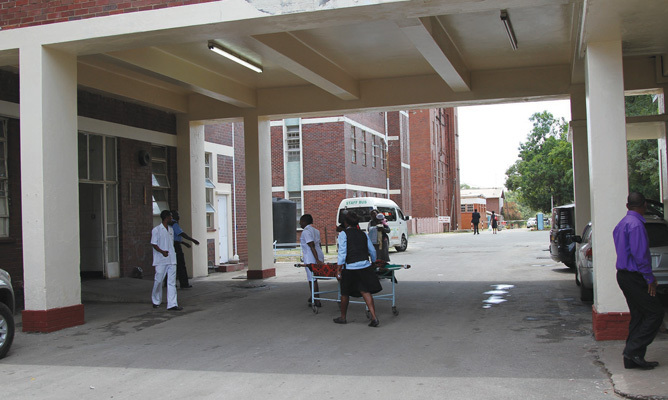By Bridget Mananavire
Public hospitals could be driven towards the brink of closure through the implementation of a long-standing government policy compelling them to offer free treatment to expecting mothers, children under the age of five, and citizens above the age of 65 years.

This follows a recent directive issued by the ministry of Health and Child Care to all public health institutions that had hitherto been allowed by the administration of former president Robert Mugabe to recoup all their expenses from patients regardless of age or special condition in order to stay afloat.
But with elections around the corner, President Emmerson Mnangagwa’s government has dusted the files by enforcing the policy under the guise of implementing the ministry of Health’s 100-day action plan.
Health experts are, however, alarmed by the directive.
They feel there is urgent need to first secure funding to subsidise the public hospitals that were generating essential cash flows from hospital fees levied on expecting mothers, senior citizens and children under the age of five.
In the absence of government support, they warned that patients could in the end pay a heavy price for it since the levels of health care in public institutions could further deteriorate, leading to the possible closure of some of the facilities.
Community Working Group on Health executive director, Itai Rusike, said the major impediment towards the implementation of the long-standing policy had always been lack of resources.
“We can only achieve this if we increase the domestic funding towards health and increase the budget allocation to at least 15 percent of the total budget as required by the Abuja declaration,” he said.
“The health sector used to be second after Education (in terms of budgetary allocations but) now it has been relegated to number five,” Rusike told the Daily News.
Rusike said there was real and present danger that most facilities could be forced to close if additional resources are not found to bridge the funding gap.
“So what we need is action not just talk. Yes we welcome the directive because it will promote health-seeking behaviour among the population but there is also the danger that there won’t be quality services,” he added.
In the 2018 National Budget, Finance minister Patrick Chinamasa allocated a measly $454 million towards the health sector, against the required $1,3 billion.
Out of that vote, $297 million is expected to go towards employment costs while and $119 million would be for operations and maintenance.
To bridge the gap, government is pinning its hopes on a $239,6 million support from development partners.
In his budget analysis, Prosper Chitambara, an economic expert, averred that not much was being done to guarantee quality of healthcare.
“Per capita health allocation stands at about $30 in 2018 up from $22 in 2017 and about US$24 in 2016. The inadequate public financing of health has resulted in an overreliance on out-of-pocket and external financing which is highly unsustainable,” he argued.
“The per capita allocation is much lower when you remove the employment cost component. The per capita health allocation is lower than the Sadc average of $146. Per capita health allocation is $650 in South Africa, $90 in Zambia and $200 in Angola.”
Most government programmes are being supported by development partners through initiatives such as Resource-based Financing and the Health Development Fund.
Rusike said it was not sustainable to continue relying on donors since some of the programmes will be coming to an end.
He said it was more sustainable for government to consider introducing a national health insurance scheme where everyone contributes.
The Zimbabwe Association of Doctors for Human Rights said government should increase its investments into the health sector.
“No woman should die while giving birth. Increasing access to care by limiting barriers that is user fees et cetera by pregnant women should be coupled with increased investment in the sector by the government,” the association said on its Twitter account.
The issue of free user fees dates back to 1980 when Zimbabwe gained its independence from Britain.
Back then, it was easy to implement the policy because it was backed by an Act of Parliament.
At the time, the policy also covered workers who were earning less than ZW$150 per month and could not afford paying for health services.
In order to cushion the health institutions, government used to release a subsidy to the Department of Social Welfare, which was billed by hospitals providing services to the under privileged.
It was also the trend back then for health facilities owned by local authorities and churches to receive grants from international partners to enable them to provide services to vulnerable groups.
However, these have not been getting any grants for the last 20 years or so.
When the situation in public hospitals turned ugly, government made a complete U-turn on the policy to enable them to recoup their expenses from patients.
Interestingly, towards the 2008 elections, the populist government of Robert Mugabe made another policy change.
It was announced that there would be free treatment for under-fives and those over 65 without any Act of Parliament to support the directive.
This resulted in a situation whereby mothers were detained at hospitals for failing to settle their bills.
In the case of citizens above 65 years of age, while there were not asked to pay for admission fees, they were made to pay for other services such as the cost of x-rays. DailyNews






